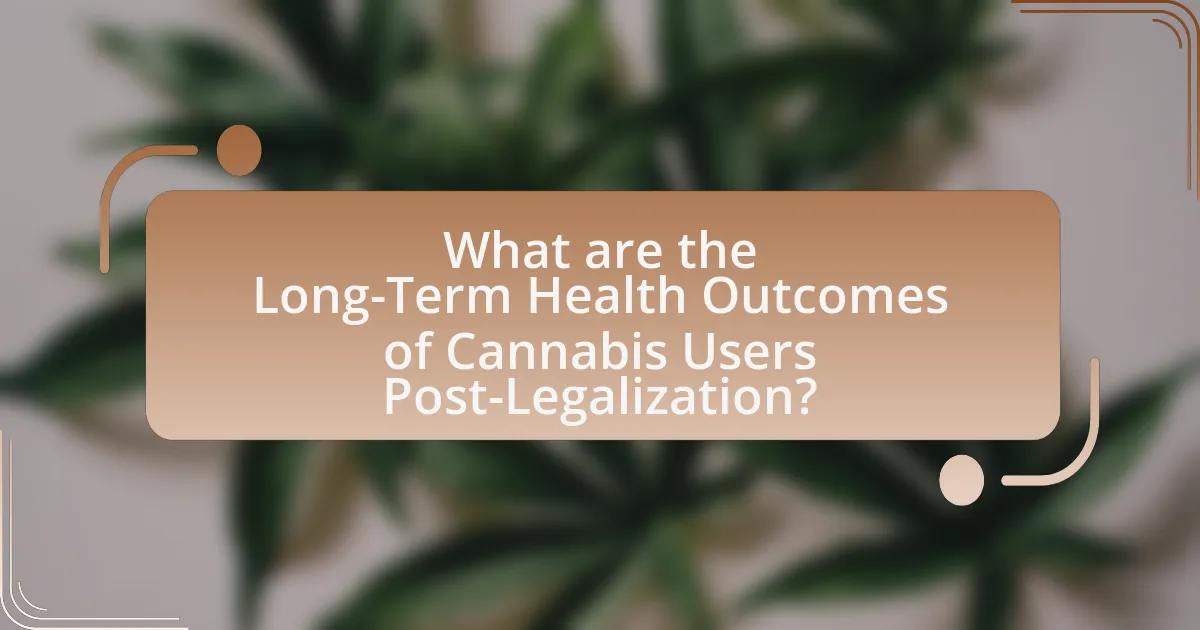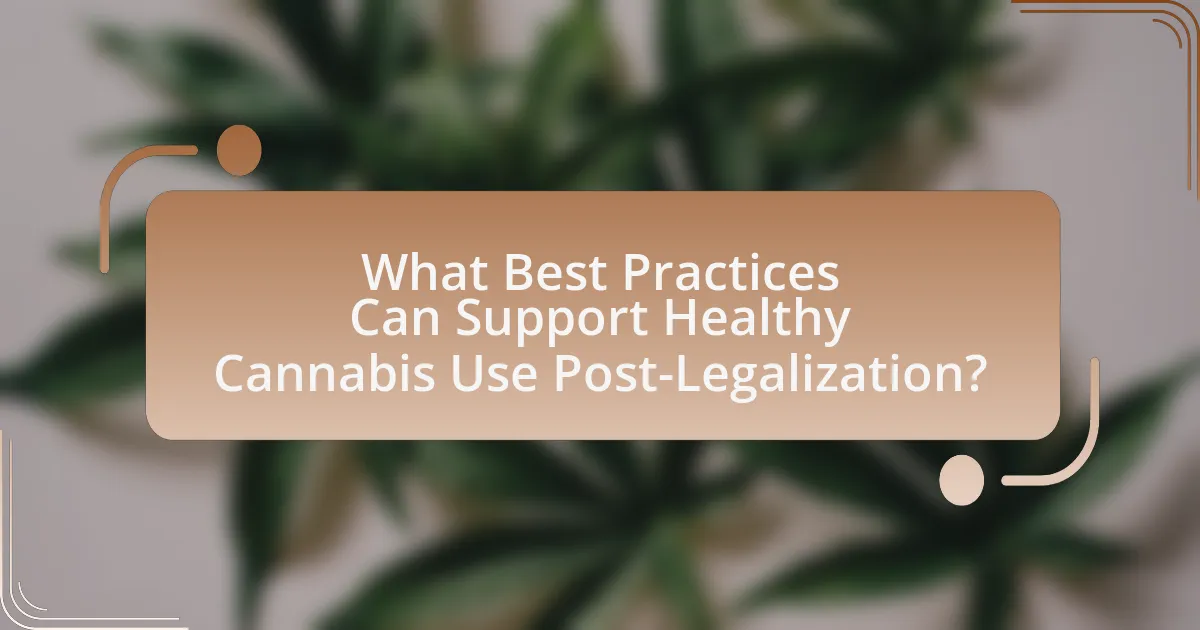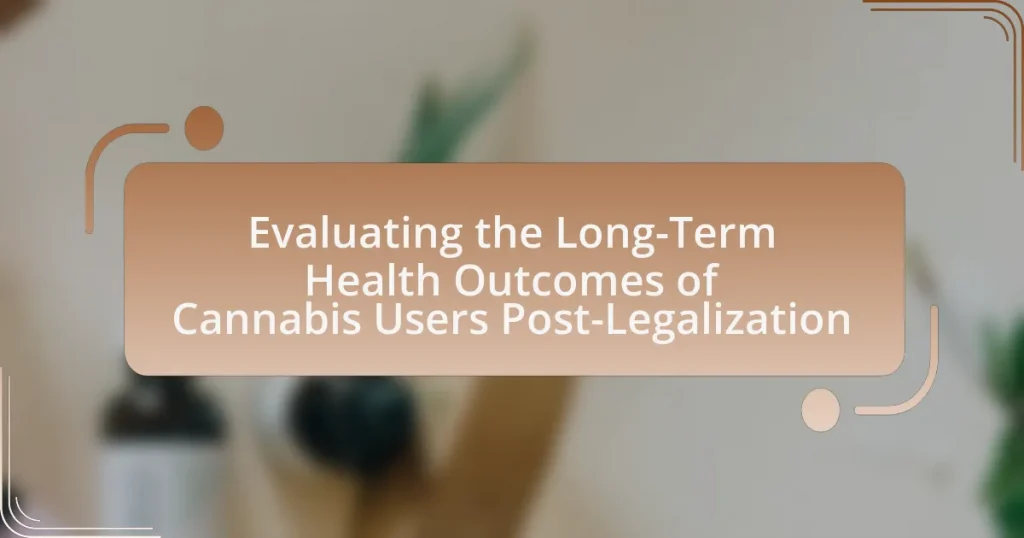The article evaluates the long-term health outcomes of cannabis users following legalization, highlighting both positive and negative effects. Key findings indicate increased respiratory issues, potential mental health risks, and varying impacts on chronic pain management. Research shows that while cannabis may reduce opioid prescriptions and improve access to mental health treatments, it is also linked to heightened anxiety, depression, and dependency rates. Additionally, demographic factors such as age and gender significantly influence health outcomes, with younger users facing greater risks. The article emphasizes the importance of education and responsible usage practices to mitigate health risks associated with cannabis consumption.

What are the Long-Term Health Outcomes of Cannabis Users Post-Legalization?
Long-term health outcomes of cannabis users post-legalization include increased respiratory issues, potential mental health effects, and varying impacts on chronic pain management. Studies indicate that regular cannabis use can lead to chronic bronchitis symptoms due to inhalation of smoke, similar to tobacco. Research published in the Journal of the American Medical Association found that cannabis users may experience heightened risks of anxiety and depression, particularly in those with a predisposition to mental health disorders. Additionally, while some users report effective pain relief, the long-term efficacy and safety of cannabis for chronic pain management remain under investigation, with mixed results in clinical trials.
How has cannabis legalization impacted health outcomes?
Cannabis legalization has generally led to improved health outcomes, particularly in the areas of pain management and mental health. Research indicates that states with legalized cannabis have reported a decrease in opioid prescriptions, suggesting that cannabis may serve as an effective alternative for pain relief. A study published in the Journal of the American Medical Association found that states with medical cannabis laws experienced a 25% reduction in opioid overdose deaths. Additionally, legalization has been associated with increased access to mental health treatments, as cannabis is often used to alleviate symptoms of anxiety and depression. A survey conducted by the American Psychological Association revealed that many users report improved mental health after using cannabis legally.
What studies have been conducted on cannabis users after legalization?
Numerous studies have been conducted on cannabis users after legalization, focusing on various health outcomes and behavioral changes. For instance, a study published in the journal “JAMA Network Open” in 2021 by authors including Dr. Kevin P. Hill examined the impact of cannabis legalization on substance use patterns, revealing an increase in cannabis use among adults but a decrease in opioid prescriptions. Another significant study, conducted by the National Institute on Drug Abuse in 2020, assessed the mental health effects of cannabis legalization, finding no significant increase in mental health disorders among users post-legalization. Additionally, research from the University of California, Berkeley, published in 2022, explored the long-term health effects of cannabis use, indicating that while some users reported improved quality of life, others experienced adverse effects such as respiratory issues. These studies collectively contribute to understanding the long-term health outcomes of cannabis users following legalization.
What are the key findings regarding physical health outcomes?
Key findings regarding physical health outcomes indicate that cannabis users post-legalization experience both positive and negative health effects. Research shows that while some users report reduced chronic pain and improved sleep quality, there is also an associated increase in respiratory issues and potential cardiovascular risks. A study published in the Journal of Cannabis Research by Hindocha et al. (2020) found that long-term cannabis use can lead to increased instances of bronchitis-like symptoms, while another study in the American Journal of Public Health by Smart and Pacula (2019) highlighted a correlation between cannabis use and elevated heart rate, which may pose risks for individuals with pre-existing heart conditions. These findings underscore the complex nature of physical health outcomes in cannabis users following legalization.
What psychological effects have been observed in cannabis users post-legalization?
Cannabis users post-legalization have exhibited increased rates of anxiety, depression, and psychosis. Research indicates that while some individuals report therapeutic benefits, others experience heightened psychological distress. A study published in the journal “Psychological Medicine” found that cannabis use is associated with a 50% increase in the risk of developing anxiety disorders among users. Additionally, data from the National Epidemiologic Survey on Alcohol and Related Conditions revealed that cannabis users are more likely to experience depressive symptoms compared to non-users. These findings underscore the complex psychological landscape surrounding cannabis use following legalization.
How does cannabis use affect mental health conditions?
Cannabis use can exacerbate certain mental health conditions, particularly anxiety and psychosis. Research indicates that individuals with a predisposition to mental health disorders may experience heightened symptoms when using cannabis, especially strains high in THC. A study published in the journal “Psychological Medicine” found that regular cannabis users had a 50% increased risk of developing psychotic disorders compared to non-users. Additionally, the National Institute on Drug Abuse reports that cannabis can trigger anxiety and panic attacks in some users, particularly in those with a history of anxiety disorders.
What are the implications for addiction and dependency rates?
The implications for addiction and dependency rates following cannabis legalization indicate a potential increase in both conditions among users. Research published in the journal “JAMA Psychiatry” found that cannabis use disorder rates rose significantly in states where cannabis was legalized, with a 20% increase in prevalence compared to states where it remained illegal. This suggests that while legalization may reduce stigma and increase access, it also correlates with higher rates of dependency, particularly among younger populations. Furthermore, the National Institute on Drug Abuse reported that approximately 9% of cannabis users develop a dependency, a figure that rises to about 17% for those who start using in adolescence. These statistics underscore the need for ongoing monitoring and public health strategies to address the potential rise in addiction and dependency rates post-legalization.
What demographic factors influence health outcomes among cannabis users?
Demographic factors such as age, gender, socioeconomic status, and ethnicity significantly influence health outcomes among cannabis users. Research indicates that younger users, particularly those aged 18-24, often report higher rates of mental health issues, including anxiety and depression, compared to older users. Gender differences also play a role, with studies showing that women may experience more adverse effects related to cannabis use, such as increased anxiety, than men. Socioeconomic status affects access to healthcare and education about cannabis, impacting health outcomes; lower socioeconomic groups may face higher risks of negative health effects due to limited resources. Ethnic disparities exist as well, with certain ethnic groups experiencing different health outcomes based on cultural attitudes towards cannabis and varying rates of use. These factors collectively shape the overall health profile of cannabis users, as evidenced by studies like “Cannabis Use and Mental Health: A Review of the Evidence” published in the Journal of Affective Disorders, which highlights the correlation between demographic variables and health outcomes.
How do age and gender affect the health impacts of cannabis use?
Age and gender significantly influence the health impacts of cannabis use, with varying effects observed across different demographics. Research indicates that younger individuals, particularly adolescents, are at a higher risk for developing cannabis use disorders and experiencing negative cognitive effects, as their brains are still developing. A study published in the journal “JAMA Psychiatry” found that early onset cannabis use is associated with an increased risk of mental health issues, including anxiety and depression, particularly in males.
In contrast, older adults may experience different health impacts, often using cannabis for pain management or to alleviate symptoms of chronic conditions. A study in “The American Journal of Geriatric Psychiatry” highlighted that older women reported using cannabis primarily for medical purposes, with fewer adverse effects compared to younger users. Gender differences also play a role; women generally report higher sensitivity to cannabis and may experience more pronounced effects, including anxiety or paranoia, compared to men.
Overall, age and gender are critical factors that shape the health outcomes associated with cannabis use, with evidence suggesting that younger users face greater risks while older adults may benefit from its therapeutic properties.
What role does frequency of use play in long-term health outcomes?
Frequency of use significantly influences long-term health outcomes, particularly among cannabis users. Research indicates that higher frequency of cannabis consumption is associated with increased risks of mental health issues, such as anxiety and depression, as well as potential cognitive impairments. A study published in the journal “JAMA Psychiatry” found that daily cannabis users exhibited a higher prevalence of psychiatric disorders compared to occasional users. Additionally, frequent use can lead to cannabis use disorder, which affects approximately 9% of users overall, increasing to 17% for those who start using in adolescence. These findings underscore the importance of frequency in determining the health implications of cannabis use over time.

What are the Risks Associated with Long-Term Cannabis Use?
Long-term cannabis use is associated with several risks, including cognitive impairment, mental health issues, and respiratory problems. Research indicates that prolonged use can lead to deficits in attention, memory, and learning, as evidenced by a study published in the journal “Psychological Medicine,” which found that heavy cannabis users exhibited significant cognitive decline over time. Additionally, long-term use is linked to an increased risk of anxiety, depression, and psychosis, particularly in individuals with a predisposition to mental health disorders, as highlighted in a meta-analysis in “The Lancet Psychiatry.” Furthermore, smoking cannabis can lead to chronic bronchitis and other respiratory issues, similar to the effects of tobacco smoking, according to findings in the “American Journal of Respiratory and Critical Care Medicine.”
What are the potential negative health effects of prolonged cannabis use?
Prolonged cannabis use can lead to several negative health effects, including cognitive impairment, respiratory issues, and increased risk of mental health disorders. Research indicates that long-term cannabis consumption is associated with deficits in attention, memory, and learning, as evidenced by a study published in the journal “Psychological Medicine” which found that heavy users exhibited significant cognitive decline compared to non-users. Additionally, smoking cannabis can harm lung health, similar to tobacco, as shown in a study from the “American Journal of Respiratory and Critical Care Medicine,” which reported that regular cannabis smokers experienced chronic bronchitis symptoms. Furthermore, prolonged use is linked to an increased risk of anxiety, depression, and psychosis, particularly in individuals with a predisposition to these conditions, as highlighted in a meta-analysis published in “The Lancet Psychiatry.”
How does cannabis use correlate with respiratory issues?
Cannabis use is associated with respiratory issues, particularly when smoked, as it can lead to chronic bronchitis and other lung-related problems. Studies indicate that inhaling cannabis smoke exposes users to similar harmful substances as tobacco smoke, including tar and carcinogens, which can irritate the airways and lead to respiratory symptoms. Research published in the journal “Chest” found that regular cannabis smokers reported more respiratory symptoms, such as cough and phlegm production, compared to non-smokers. Furthermore, a study in the “American Journal of Respiratory and Critical Care Medicine” highlighted that long-term cannabis smoking is linked to increased airway resistance and decreased lung function.
What are the cardiovascular risks linked to long-term cannabis consumption?
Long-term cannabis consumption is associated with several cardiovascular risks, including increased heart rate, elevated blood pressure, and a higher likelihood of developing cardiovascular diseases. Research indicates that cannabis use can lead to acute cardiovascular events, such as myocardial infarction, particularly in individuals with pre-existing heart conditions. A study published in the Journal of the American College of Cardiology found that cannabis users had a 3.4 times higher risk of heart attack compared to non-users. Additionally, chronic use may contribute to the development of atherosclerosis, as cannabis can affect endothelial function and promote inflammation. These findings underscore the potential cardiovascular implications of prolonged cannabis use.
How does cannabis use affect cognitive function over time?
Cannabis use negatively affects cognitive function over time, particularly in areas such as memory, attention, and executive functioning. Longitudinal studies indicate that regular cannabis users may experience a decline in cognitive abilities, with research showing that heavy use can lead to impairments comparable to those seen in individuals with mild cognitive impairment. For instance, a study published in the journal “JAMA Internal Medicine” found that individuals who used cannabis frequently exhibited a significant decline in cognitive performance over a period of years, particularly in tasks requiring memory and attention. Additionally, a meta-analysis in “Psychological Medicine” highlighted that adolescents who initiate cannabis use are at a higher risk for long-term cognitive deficits, emphasizing the importance of age of onset in determining cognitive outcomes.
What evidence exists regarding memory and learning impairments?
Evidence indicates that cannabis use is associated with memory and learning impairments. Research published in the journal “Neuropsychopharmacology” by Meier et al. (2012) found that persistent cannabis use was linked to a decline in IQ and cognitive functioning, particularly in individuals who began using cannabis during adolescence. Additionally, a meta-analysis in “Psychological Bulletin” by Scott et al. (2018) reported that cannabis users exhibited deficits in verbal learning and memory tasks compared to non-users. These findings suggest that cannabis consumption can negatively impact cognitive processes essential for learning and memory retention.
How does cannabis impact overall brain health in long-term users?
Cannabis negatively impacts overall brain health in long-term users by altering brain structure and function. Research indicates that chronic cannabis use is associated with cognitive impairments, particularly in memory, attention, and executive function. A study published in the journal “JAMA Internal Medicine” found that long-term cannabis users exhibited a decline in cognitive performance compared to non-users, highlighting potential neurotoxic effects. Additionally, neuroimaging studies have shown alterations in brain regions such as the hippocampus and prefrontal cortex, which are critical for memory and decision-making. These findings suggest that prolonged cannabis use can lead to significant changes in brain health and cognitive abilities.
What are the social implications of long-term cannabis use?
Long-term cannabis use has significant social implications, including potential impacts on mental health, social relationships, and community dynamics. Research indicates that prolonged use can lead to increased rates of anxiety, depression, and psychosis, which can strain interpersonal relationships and social networks. A study published in the journal “Psychological Medicine” found that individuals who use cannabis regularly are more likely to experience social withdrawal and isolation, affecting their ability to maintain friendships and engage in community activities. Additionally, long-term cannabis use can influence societal perceptions and stigma, potentially leading to discrimination against users in various social contexts, such as employment and education. These factors collectively contribute to a complex social landscape surrounding cannabis use, particularly in regions where it has been legalized.
How does cannabis use affect social relationships and community engagement?
Cannabis use can negatively impact social relationships and community engagement by leading to social withdrawal and reduced participation in community activities. Research indicates that frequent cannabis users may experience diminished social interactions due to altered perceptions and behaviors, which can result in isolation. A study published in the journal “Psychological Medicine” found that heavy cannabis use is associated with lower levels of social support and increased feelings of loneliness. Additionally, community engagement may decline as users prioritize substance use over social or civic responsibilities, further weakening community ties.
What are the economic impacts of cannabis use on healthcare systems?
Cannabis use has significant economic impacts on healthcare systems, primarily through reduced healthcare costs associated with certain medical conditions. Studies indicate that states with legalized cannabis have experienced lower prescription drug expenditures, particularly for pain management, which can lead to overall savings in healthcare spending. For instance, a study published in Health Affairs found that states with medical cannabis laws saw a 15% reduction in opioid prescriptions, suggesting a shift in treatment options that can alleviate the financial burden on healthcare systems. Additionally, cannabis use has been linked to decreased hospitalizations for conditions like anxiety and depression, further contributing to cost savings. These economic impacts highlight the potential for cannabis to alter healthcare expenditure patterns positively.

What Best Practices Can Support Healthy Cannabis Use Post-Legalization?
Best practices that can support healthy cannabis use post-legalization include education on responsible consumption, understanding dosage, and awareness of individual health conditions. Education ensures users are informed about the effects of cannabis, including potential risks and benefits, which can lead to more responsible choices. Understanding dosage is crucial, as it helps users avoid overconsumption and its associated negative effects; studies indicate that lower doses can provide therapeutic benefits without significant impairment. Additionally, awareness of individual health conditions, such as mental health issues or substance use disorders, is essential, as these factors can influence how cannabis affects a person. Research shows that individuals with a history of mental health issues may experience exacerbated symptoms with cannabis use, highlighting the importance of personalized approaches to consumption.
How can users minimize health risks associated with cannabis consumption?
Users can minimize health risks associated with cannabis consumption by adopting responsible usage practices, such as starting with low doses, choosing safer consumption methods, and avoiding use in combination with other substances. Research indicates that starting with low doses can help prevent adverse effects, as higher doses are linked to increased risks of anxiety and psychosis. Additionally, opting for methods like vaporization or edibles instead of smoking can reduce respiratory issues associated with inhaling combusted materials. Furthermore, avoiding concurrent use of alcohol or other drugs can decrease the likelihood of negative interactions and enhance overall safety.
What guidelines should users follow for responsible cannabis use?
Users should follow guidelines that prioritize moderation, informed decision-making, and awareness of legal regulations for responsible cannabis use. Moderation involves consuming cannabis in controlled amounts to avoid adverse effects, as excessive use can lead to dependency and health issues. Informed decision-making requires users to understand the potency and effects of different cannabis strains, which can vary significantly; for instance, THC levels can range from 5% to over 30%, impacting the experience and potential risks. Awareness of legal regulations is crucial, as cannabis laws differ by region, and users must comply with local laws regarding possession, use, and distribution to avoid legal consequences. Following these guidelines can help mitigate risks associated with cannabis use and promote a safer experience.
How can education and awareness improve health outcomes for cannabis users?
Education and awareness can significantly improve health outcomes for cannabis users by providing them with accurate information about safe usage, potential risks, and benefits. When cannabis users are educated about dosage, methods of consumption, and the effects of different strains, they are more likely to make informed choices that minimize adverse health effects. For instance, studies have shown that users who understand the risks associated with high THC concentrations are less likely to experience anxiety or paranoia. Furthermore, awareness campaigns can address misconceptions about cannabis, leading to more responsible use and reducing stigma, which can enhance users’ willingness to seek medical help when needed. This comprehensive understanding ultimately contributes to better health management and outcomes for cannabis users.
What resources are available for cannabis users seeking support?
Cannabis users seeking support can access various resources, including counseling services, support groups, and educational programs. Organizations such as the National Organization for the Reform of Marijuana Laws (NORML) provide information and advocacy for cannabis users, while local community health centers often offer counseling and treatment options tailored to substance use. Additionally, online platforms like the Substance Abuse and Mental Health Services Administration (SAMHSA) provide a national helpline and resources for individuals seeking help with substance use issues, including cannabis. These resources are essential for users looking to understand the health implications of cannabis use and to seek assistance if needed.
How can healthcare providers assist cannabis users in managing their health?
Healthcare providers can assist cannabis users in managing their health by offering personalized guidance on dosage, potential interactions with other medications, and monitoring for side effects. This support is crucial as cannabis can affect individuals differently based on their health conditions and treatment plans. Research indicates that healthcare professionals who are knowledgeable about cannabis can help users make informed decisions, thereby improving their overall health outcomes. For instance, a study published in the Journal of Cannabis Research highlights that patients who receive tailored advice from healthcare providers report better management of symptoms related to chronic pain and anxiety when using cannabis.
What community programs exist to promote safe cannabis use?
Community programs that promote safe cannabis use include educational initiatives, harm reduction strategies, and support groups. For instance, organizations like the National Organization for the Reform of Marijuana Laws (NORML) provide resources and information on responsible cannabis consumption. Additionally, local health departments often implement programs that focus on educating the public about the risks and benefits of cannabis use, emphasizing moderation and informed decision-making. Research indicates that such educational programs can lead to more responsible usage patterns and reduce the incidence of cannabis-related health issues.


